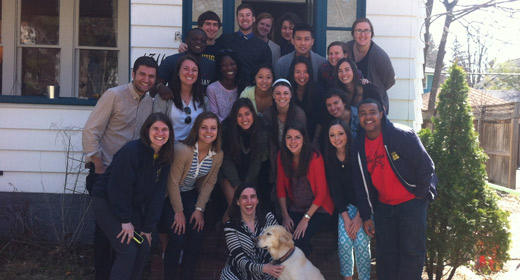
Students in Public Policy 475: "Philanthropic Foundations in the Public Arena" spent the semester getting a taste of what it means to be a philanthropist in a nonprofit organization. Taught by Lecturer Megan Tompkins-Stange, the class used a $55,000 grant from the Once Upon a Time Foundation to support a semester-long project, in which students collaborated to determine which nonprofit organizations to support, how to allocate and award the funding, and how to evaluate the impact of the gifts.
Tompkins-Stange designed the class to give students a real feel for the tension between the "autonomy [that] allows foundations to achieve effective outcomes by taking risks, innovating with new programs, and moving with more agility than the bureaucratically constrained state," and the amplification of "elite voices outside of democratic processes, leading to normative concerns about power and control by the wealthy within the public realm."
Bachelor's of public policy student Mackenzie Humble explained that the process was both competitive and collaborative. The class ran "very similarly to a foundation board of directors. Each step of the process we split into teams and 'pitched' our organizations while simultaneously completing readings and assignments" about philanthropy.
The class chose to provide grants of $25,000 to Freedom House, $20,000 to SafeHouse, and $10,000 to Earthworks Urban Farm. These three organizations were selected from an initial pool of twenty.
John Yim, another bachelor's of public policy student, said the process encouraged "thought-provoking discussions" and an opportunity for students to "express [their] passions in the various spheres of social justice" they had come to care about during their studies at the University of Michigan.
For both Humble and Yim, the experimental nature of the class had a profound impact on their perspectives and career ambitions: It transformed philanthropy, "from a seemingly distant ideology into an introspective reality," said Yim, helping students better understand "the unnatural act of giving."
Humble added, "Coming into the class I was set on graduating next year and becoming an investment banker on Wall St, but after discussing venture philanthropy at length with Professor Tompkins-Stange, I am currently exploring the philanthropy space as a potential career path. This class has taught me, more than anything else, that I can have a fast-paced, largely business focused career in the philanthropy space while still advocating for policy objectives I'm passionate about."
For more information about the Bachelor of Arts in Public Policy at the Ford School, see the program overview.
